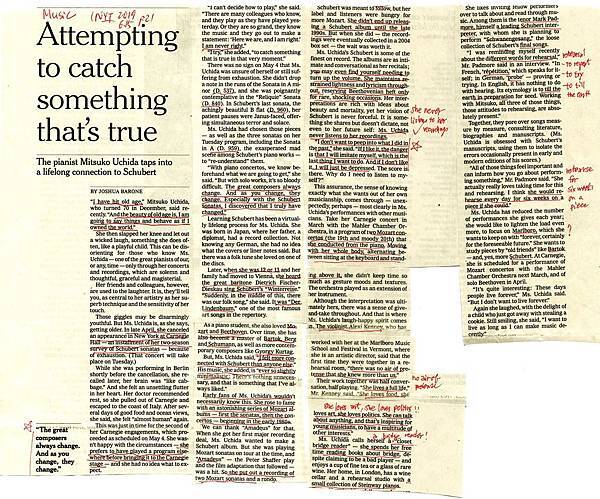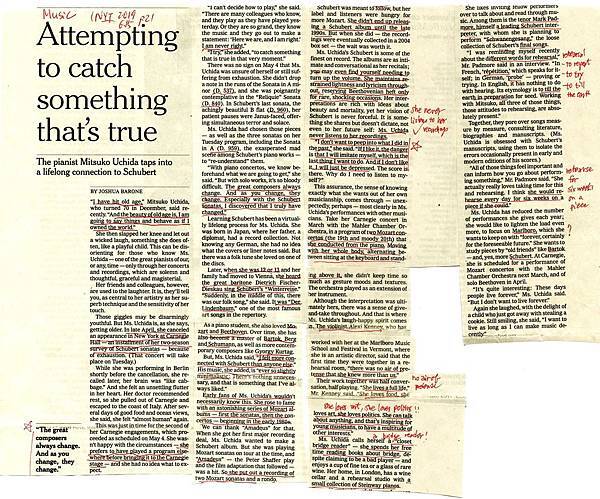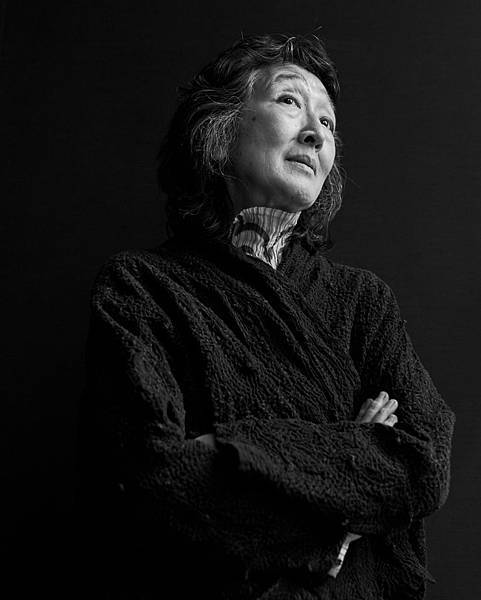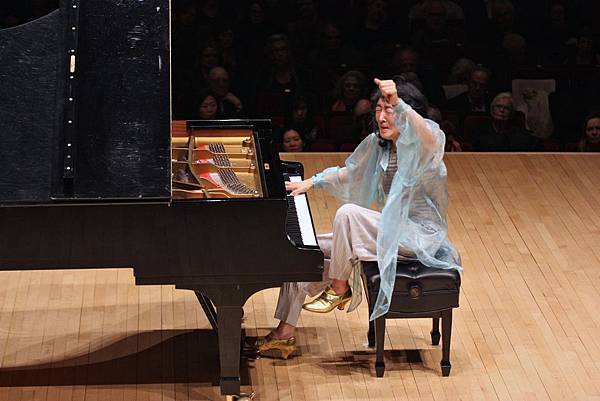內田光子女爵士
Accessed July 1, 2019
內田光子女爵士
"She makes love to the piano on stage!"
1980-90年代在華府,我幾乎每週都去逛的古典音樂CD 店老闆如此對我說。已經好多次在甘迺迪中心聽她又纏綿又激情的演奏,我立刻抒懷的笑了。再也不忘那生動的描寫。
紐約時報的專訪特點如下
● 她從不聽自己彈奏的唱片, 因為不滿意會不高興,而滿意會喜歡以前的詮釋,而
不再求進步。
●雖然1980年代她以莫扎特專家竄起,其實她一向都最喜歡修伯特。當時因為電影Amadeus激起人們對莫扎特的時髦興趣,內田光子被邀演奏。
●她可以為了演奏連著六個星期練習一個曲目。
Mitsuko Uchida Will Never Be Done With Schubert
The pianist is returning to one of the first composers she loved in a concert at Carnegie Hall.
accessed June 22, 2019
The pianist Mitsuko Uchida. She will perform at Carnegie Hall on June 18, part of a two-season survey of Schubert sonatas.CreditVincent Tullo for The New York Times
Image
The pianist Mitsuko Uchida. She will perform at Carnegie Hall on June 18, part of a two-season survey of Schubert sonatas.CreditCreditVincent Tullo for The New York Times
By Joshua Barone
• June 14, 2019
“I have hit old age,” Mitsuko Uchida, who turned 70 in December, said recently. “And the beauty of old age is, I am going to say things and behave as if I owned the world.”
She then slapped her knee and let out a wicked laugh, something she does often, like a playful child. This can be disorienting for those who know Ms. Uchida — one of the great pianists of our, or any, time — only through her concerts and recordings, which are solemn and thoughtful, graceful and magisterial.
Her friends and colleagues, however, are used to the laughter. It is, they’ll tell you, as central to her artistry as her superb technique and the sensitivity of her touch.
Those giggles may be disarmingly youthful. But Ms. Uchida is, as she says, getting older. In late April, she canceled an appearance at Carnegie Hall — an installment of her two-season survey of Schubert sonatas — because of exhaustion. (That concert will take place on June 18.)
While performing in Berlin shortly before the cancellation, she recalled later, her brain was “like cabbage.” And she felt an unsettling flutter in her heart. Her doctor recommended rest, so she pulled out of Carnegie and escaped to the coast of Italy. After several days of good food and ocean views, she said, she felt “almost human” again.
This was just in time for the second of her Carnegie engagements, which proceeded as scheduled on May 4. She wasn’t happy with the circumstances — she prefers to have played a program elsewhere before bringing it to the Carnegie stage — and she had no idea what to expect.
“I can’t decide how to play,” she said. “There are many colleagues who know, and they play as they have played yesterday. Or they are so grand, they know the music and they go out to make a statement: ‘Here we are, and I am right.’ I am never right.”
“I try,” she added, “to catch something that is true in that very moment.”
Ms. Uchida at Carnegie Hall in 2016.CreditHiroyuki Ito for The New York Times
Image
Ms. Uchida at Carnegie Hall in 2016.CreditHiroyuki Ito for The New York Times
There was no sign on May 4 that Ms. Uchida was unsure of herself or still suffering from exhaustion. She didn’t drop a note in the runs of the Sonata in A minor (D. 537), and she was poignantly contemplative in the “Reliquie” Sonata (D. 840). In Schubert’s last sonata, the achingly beautiful B flat (D. 960), her patient pauses were Janus-faced, offering simultaneous terror and solace.
ADVERTISEMENT
Ms. Uchida had chosen those pieces — as well as the three sonatas on her June 18 program, including the Sonata in A (D. 959), the exasperated mad scene among Schubert’s piano works — because she wanted to “re-understand” them.
“With piano concertos, we know beforehand what we are going to get,” she said. “But with solo works, it’s so bloody difficult. The great composers always change. And as you change, they change. Especially with the Schubert sonatas, I discovered that I truly have changed.”
Learning Schubert has been a virtually lifelong process for Ms. Uchida. She was born in Japan, where her father, a diplomat, had a record collection. Not knowing any German, she had no idea what the covers or liner notes said. But there was a folk tune she loved on one of the discs.
Later, when she was 12 or 13 and her family had moved to Vienna, she heard the great baritone Dietrich Fischer-Dieskau sing Schubert’s “Winterreise.” “Suddenly, in the middle of this, there was our folk song,” she said. It was “Der Lindenbaum,” one of the most famous art songs in the repertory.
As a piano student, she also loved Mozart and Beethoven. Over time, she has also become a master of Bartok, Berg and Schumann, as well as more contemporary composers like Gyorgy Kurtag.
But, Ms. Uchida said, “I felt more connected with Schubert than anyone else.” His music, she added, is “ever so slightly minimalistic: There’s nothing unnecessary, and that is something that I’ve always liked.”
ADVERTISEMENT
Early fans of Ms. Uchida’s wouldn’t necessarily know this. She rose to fame with an astonishing series of Mozart albums — first the sonatas, then the concertos — beginning in the early 1980s.
We can thank “Amadeus” for that. When she got her first major recording deal, Ms. Uchida wanted to make a Schubert album. But she was playing Mozart sonatas on tour at the time, and “Amadeus” — the Peter Shaffer play and the film adaptation that followed — was a hit. So she put out a recording of two Mozart sonatas and a rondo.
Schubert was meant to follow, but her label and listeners were hungry for more Mozart. She didn’t end up releasing a Schubert album until the late 1990s. But when she did — the recordings were eventually collected in a 2004 box set — the wait was worth it.
Ms. Uchida’s Schubert is some of the finest on record. The albums are as intimate and conversational as her recitals; you may even find yourself needing to turn up the volume. She maintains restrained lightness and lyricism throughout, reserving Beethovenian heft only for rare, shocking occasions. Her interpretations are rich with ideas about beauty and mortality, yet her vision of Schubert is never forceful. It is something she shares but doesn’t dictate, not even to her future self: Ms. Uchida never listens to her recordings.
“I don’t want to peep into what I did in the past,” she said, “If I like it, the danger is that I will imitate myself, which is the last thing I want to do. And If I don’t like it, I will just be depressed. The score is there. Why do I need to listen to myself?”
ADVERTISEMENT
This assurance, the sense of knowing exactly what she wants out of her own musicianship, comes through — unexpectedly, perhaps — most clearly in Ms. Uchida’s performances with other musicians. Take her Carnegie concert in March with the Mahler Chamber Orchestra, in a program of two Mozart concertos (the 19th and moody 20th) that she conducted from the piano. Moving with her whole body, alternating between sitting at the keyboard and standing above it, she didn’t keep time so much as gesture moods and textures. The orchestra played as an extension of her instrument.
Although the interpretation was ultimately hers, there was a sense of give and take throughout. And that is where Ms. Uchida’s laugh-happy spirit comes in. The violinist Alexi Kenney, who has worked with her at the Marlboro Music School and Festival in Vermont, where she is an artistic director, said that the first time they were together in a rehearsal room, “there was no air of pretense that she knew more than us.”
Their work together was half conversation, half playing. “She lives a full life,” Mr. Kenney said. “She loves food, she loves art, she loves politics. She can talk about anything, and that’s inspiring for young musicians, to have a multitude of other interests.”
Ms. Uchida calls herself a “closet bridge reader” — she spends her free time reading books about bridge, despite claiming to be a bad player — and enjoys a cup of fine tea or a glass of rare wine. Her home, in London, has a wine cellar and a rehearsal studio with a small collection of Steinway pianos.
She likes inviting fellow performers over to talk about and read through music. Among them is the tenor Mark Padmore, himself a leading Schubert interpreter, with whom she is planning to perform “Schwanengesang,” the loose collection of Schubert’s final songs.
ADVERTISEMENT
“I was reminding myself recently about the different words for rehearsal,” Mr. Padmore said in an interview. “In French, ‘répétition,’ which speaks for itself; in German, ‘probe’ — proving or trying. In English, it has nothing to do with hearing. Its etymology is to till the earth in preparation for seed. Working with Mitsuko, all three of those things, those attitudes to rehearsing, are absolutely present.”
Together they pore over songs measure by measure, consulting literature, biographies and manuscripts. (Ms. Uchida is obsessed with Schubert’s manuscripts, using them to isolate the errors occasionally present in early and modern editions of his scores.)
“All of those things feel important and can inform how you go about performing something,” Mr. Padmore said. “She actually really loves taking time for this and rehearsing. I think she would rehearse every day for six weeks on a piece if she could.”
Ms. Uchida has reduced the number of performances she gives each year; she would like to lighten the load even more, to focus on Marlboro, which she wants to keep on with “forever, certainly for the foreseeable future.” She wants to study pieces by “old friends” like Bartok — and, yes, more Schubert. At Carnegie, she is scheduled for a performance of Mozart concertos with the Mahler Chamber Orchestra next March, and of solo Beethoven in April.
“It’s quite interesting: These days people live forever,” Ms. Uchida said. “But I don’t want to live forever.”
Again she laughed, with the delight of a kid who just got away with stealing a cookie. Still smiling, she said, “I want to live as long as I can make music decently.”
Mitsuko Uchida
June 18 at Carnegie Hall, Manhattan; carnegiehall.org.
Joshua Barone is a senior staff editor on the Culture Desk, where he writes about classical music and other fields including dance, theater and visual art and architecture. @joshbarone • Facebook
A version of this article appears in print on June 16, 2019, on Page AR18 of the New York edition with the headline: Playing To Catch Something True. Order Reprints |
























